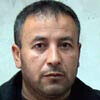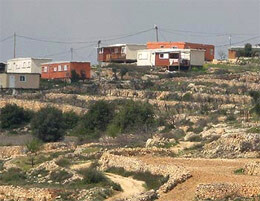B'Tselem 19 March 2007

Muhammad Salah
Two days ago [9 February], I went with my brother Salah to our fields to prune the grapevines. My children, who are six and eleven years old, and Salah’s children, who are four, six, and twelve years old, came with us. We reached the vineyards at nine in the morning and began the pruning. We finished working around three in the afternoon and left.
We walked two kilometers to the north, toward ‘Ein al-Qasis, to land belonging to my cousins, Samer and ‘Imad Salah. They had asked us to plant sage in their field. Their plot is close to the part of the Neve Daniel settlement that has nine caravans. A settler named Hananya lives there. Everybody knows him because he attacks Palestinian farmers. A few times, I saw him destroy Palestinian farmland.
After we finished our work on my cousins’ plot, we went to the spring to drink. While we were there, we saw two settlers uprooting the seedlings we had planted. My brother and I went to the field. One of the settlers grabbed the seedlings and ran toward the settlement. The other settler was Hananya. He moved to a higher spot and threw stones at us. The other settler joined him, and three more settlers came. We rushed to our children, took their hands, and ran away. The settlers chased us and threw stones at us. We ran about 500 meters. While we ran, one of the settlers got to about thirty meters from us. I was afraid that the stones would hit me or the children in the head. I asked Salah to take the children and run in another direction. I would run close to the nearest settler so that they would leave my brother and children alone.

Neve Daniel outpost (B’Tselem)
They put me on a stretcher and then into the ambulance. On the way to the hospital, an army jeep stopped us next to Route 60, near the a-Nashash checkpoint. The soldiers took the ID cards of the driver, the paramedic, and me. We told them what happened. After ten minutes passed, the soldiers let us pass. The ambulance took me to the government hospital in Beit Jala, where I underwent tests and was X-rayed. They said I had severe bruises on my back. They gave me a shot to kill the pain and they also gave me pills. I was discharged about two hours after I arrived.
My back really hurt at night and I couldn’t sleep well. Today [11 February], I went with my cousin, who owns the field where we were attacked, to file a complaint at the police station. He was filing a complaint about the uprooting of the seedlings, and I was filing about the assault. We went to the police station in Kfar Etzion. They said the station does not have an Arabic-speaking investigator, and that we would have to go to the station in Kiryat Arba. We went there and filed our complaints. The police took a photo of my back and I gave them the medical report. The investigator who took my statement told me to call him in a few days for an update on the file.
Related Links